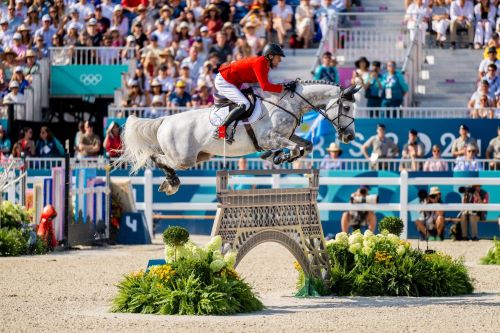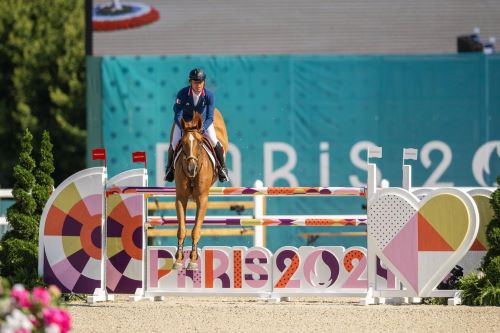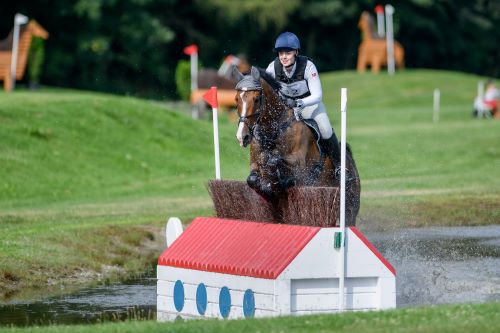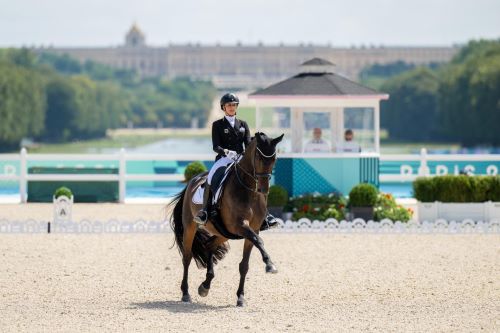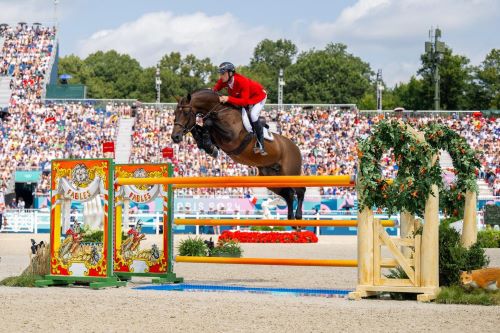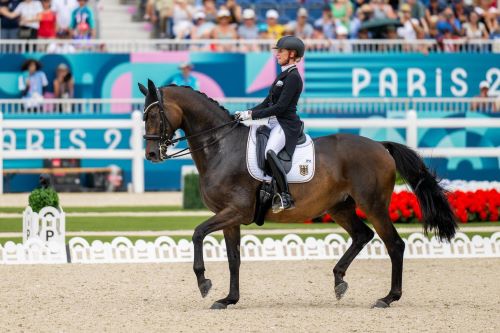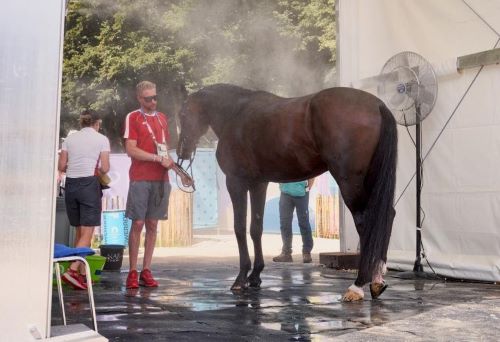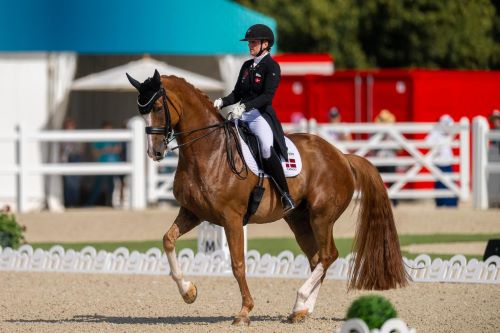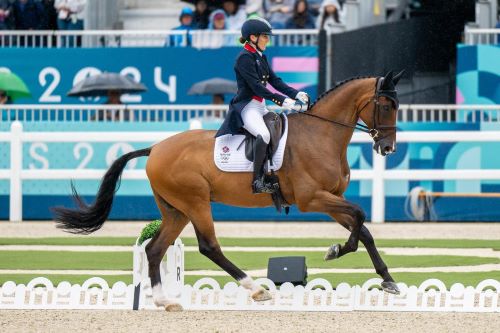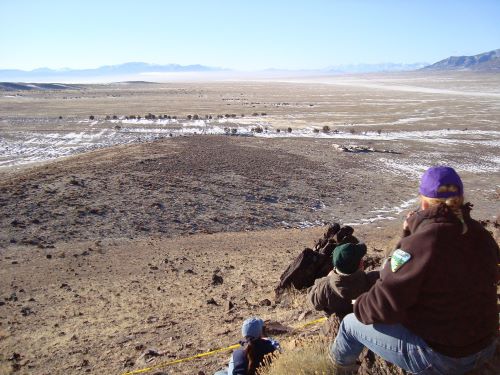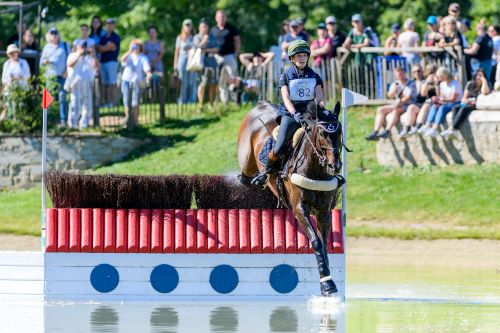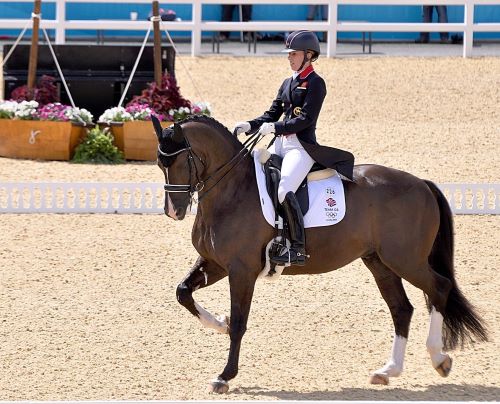L-R: Scott Brash, Harry Charles, and Ben Maher from Team GBR © FEI/Benjamin Clark
Great Britain claimed Jumping team gold in fine style at the Paris 2024 Olympic Games in Versailles (FRA) with spectacular performances from Ben Maher/Dallas Vegas Batilly, Harry Charles/Romeo 88, and Scott Brash/Jefferson. It was a clean, crisp result for the new Olympic champions, without a single fence down and counting only two time faults to seal it in the Team Final.
Team USA had to settle for silver medal spot with a final scoreline of just four faults, and in the battle for bronze, it was France that clinched it thanks to quicker combined times for their three combinations, who edged the Dutch off the podium by the narrowest of margins – 0.57 seconds – when both sides completed with seven faults on the board.
This was Britain’s third team title in the history of Jumping at the Games. The first was recorded by Wilfred White/Nizefela, Douglas Stewart/Aherlow and Harry Llewellyn/Foxhunter in Helsinki in 1952, and there was a very long wait before they did it again on home ground in London 2012. Both Maher and Brash were young guns in their 20s when competing in that four-man side 12 years ago alongside Nick Skelton and Harry’s father Peter Charles. This result resonated with that, although this time around Maher and Brash were the veterans while 25-year-old Charles was the relative rookie.
In the qualifier, Germany produced three clean sheets and looked set to threaten strongly for the title, but despite a faultless round from Philipp Weishaupt and Zineday, poles down for both Christian Kukuk’s Checker 47 and Richard Vogel’s United Touch S at the first element of the penultimate double left them sitting in fifth place at the end of the day.
The defending champions from Sweden were expected to bounce back when only Peder Fredricson and Catch Me Not S had mistakes on the course, but all three team members had a fence error to drop them behind Germany into sixth place.
The Dutch were unlucky. Kim Emmen and Imagine produced one of 11 clear rounds over the bright, beautiful but technically-demanding 14-fence track created by Santiago Varela (ESP) and Gregory Bodo (FRA), while Harrie Smolders collected only a single time fault with Uricas van de Kattevennen. However, Maikel van der Vleuten and his Tokyo 2020 individual bronze-medal winning ride Beauville Z had an awkward ride down the triple combination at fence 10 and took out the final oxer element for four faults and an additional two for time.
Meanwhile, the French began with just three time faults for pathfinder Simon Delestre and I Amelusina R 51, followed by a superb clear from Olivier Perreau and Dorai D’Aiguilly, who were called in late to the side. The crowd was on the edges of their seats as Julien Epaillard and Dubai du Cedre set off as, with just those three faults on the board, they were well within sight of at least silver. But a mistake at the Jardin à la Française oxer at fence nine left the hosts on level-pegging with The Netherlands, their narrow advantage on the clock giving them that third podium placing.
The British looked convincing from the outset, Maher and Dallas Vegas Batilly finishing just shy of the time-allowed of 79 seconds for a single time fault, while Charles and Rome 88 were crystal clear. By the time Brash and Jefferson entered the ring as anchors and the very last to go, the Americans were counting only four faults for Laura Kraut’s mistake at the first element of the triple combination, because both Karl Cook with Caracole de la Roque and Ward and Ilex had been foot-perfect.
The pressure was at boiling point as Brash set off with everything hanging in the balance. A fence down and gold would go to the USA, and two down would drop his country right out of contention. But in the years since that historic London victory at the age of 26, the Scottish-born rider has become a master of his art with a reputation for nerves of steel. As he and Jefferson galloped through the finish with just a single time penalty popping up on the scoreboard, it was time for big British celebrations.
When asked about winning the second Olympic team gold medal of his sparkling career, Brash said, “A gold medal doesn’t get old! It’s incredible, obviously, to win in London in front of our home crowd, which was one of the best days of my life, but here is right up there! I mean what an unbelievable setting, what a beautiful venue for our sport, and facilities for the horses were incredible.”
When asked what it was like to enter that cauldron of tension to secure that gold, he replied, “You’ve got to stay focused on your horse; it’s a partnership. You really need to know your horse inside out to be able to jump that course; it’s technical, it’s big, you’re jumping at the highest level, and there’s questions all around that course. So you really need to know your horse inside out and ride the best way possible for them to jump clear. You stay focused and then try and execute your plan and that’s what I tried to do, and thankfully it paid off!” he explained.
Maher said he may have underestimated the time it would take to get around the track, “but we left the jumps up and gave the team a great start!” he pointed out. “We’re talking about 0.3 of a second over the time – I could probably just have turned back shorter after the double of Liverpools (4ab) and taken a bit of a risk, but my horse is younger and our team in a good position anyway,” he explained.
He said he has a lot of faith in Dallas Vegas Batilly. “She’s been very consistent and won already some really good Grands Prix all over the world. We did the championship indoors back in April to give us some experience. There were some question marks over my change of horse last-minute, but I’m in a very fortunate position; she is the more experienced horse in the stable at the moment and I just felt that she was really on form and ready at the right time, and she’s certainly shown that today!” he said.
Charles said he initially thought the course was not too tough, “but that’s how good these course builders are – it rode completely differently to how it walked! It’s probably much more difficult than yesterday but suited my horse better with striding in between the jumps. He likes to jump from a collected canter rather than an open one so I could get to most of the jumps in a holding stride, which was a big benefit. And I wasn’t really too concerned with the time allowed. He was really quick yesterday, so I thought if I just do my normal pace I should be inside and just was. So I was pretty happy about that,” he said.
It was the USA’s third Olympic team silver in a row and their seventh in the history of the Games. Laura Kraut and McLain Ward were both on the silver-medal side in Tokyo three years ago where Kraut’s 14-year-old gelding Baloutinue also competed.
She was surprised by her horse’s single mistake at that bogey triple combination. “He kind of looked at it a little bit and I had maybe too much momentum, but other than that he didn’t put a foot wrong,” she said.
Talking about the course, she pointed out, “What’s been really nice is there’s been no eliminations, no disasters, lots of poles down and time faults, and they have been very crafty with the time allowed. I felt like I was flying, and I only came in a second and a half under the time, so I think it’s just as you would expect – we’re at the Olympics after all!”
Like Kraut, Ward knows a thing or two about the pressure of Olympic competition and he picked up his fifth medal at his sixth Olympic Games.
“Both Laura and I have been particularly blessed (competing for Team USA) for a number of years. What the Olympics represents, its principles, at its very best is something that we really are proud of and look to as a goal. Our team mentality is that this is the pinnacle of the sport. This is what we aim everything towards, not only ourselves, but everybody behind us, and we’re willing to sacrifice a lot of other events throughout the season to try to be primed at the right moment with the right combinations. That’s not to say that sometimes you think you have the recipe right and you don’t. But I think being able to pull that off a few times builds confidence, and everybody keeps delivering, and that perpetuates itself; it inspires the next generation, and it inspires all the people around us and behind us to continue,” he said.
It has taken a while for Karl Cook to build a relationship with the feisty French-bred mare Caracole de la Roque, but it has all come together beautifully now with trust established between them, particularly over the last few months. Their fabulous clear was evidence of that. “You build that trust and understanding over time. I’m thrilled with how she has been here in Paris – she’s a very wonderful horse!” he said.
The French were filled with emotion and delighted to find themselves on the podium. As Epaillard said, “We wanted a medal – and we got it!” It was even more special to do it in front of the French President Emmanuel Macron.
For Olivier Perreau, his bronze was particularly emotional because he earned it on a home-bred mare he has produced himself and which only began to show real potential over the last year. “I took her to the European Championship last year and my aim was always to have her here in Paris – I’m so proud of her and so very, very happy!” he said.
Meanwhile, delighted British Chef d’Equipe, Di Lampard, reflected on the success of her side. “The plan has come together after four years, and I’m completely overwhelmed! They were outstanding; the lads were ice-cool and delivered on the given day! We always put Ben out first; he’s the pathfinder and he’s so good at it. To put Harry in the middle was an obvious one, and his clear round was joyous and probably put even more pressure on Scott! But we know he has ice-cold veins and he delivered in real style,” she said.

